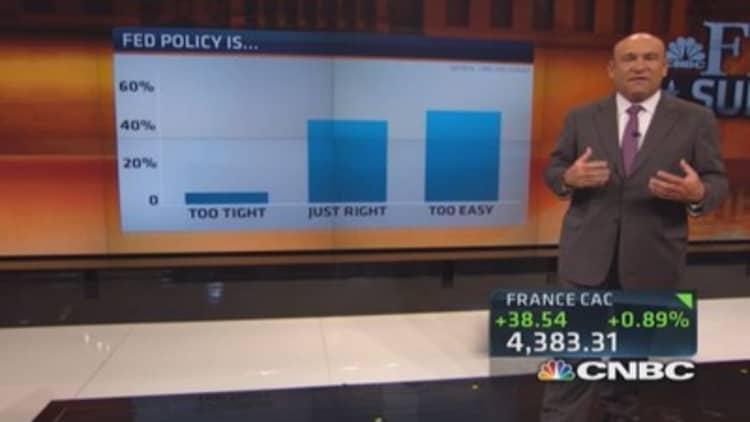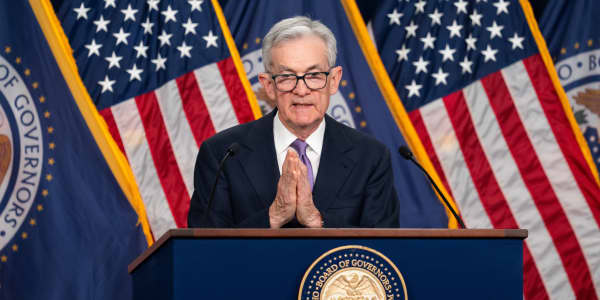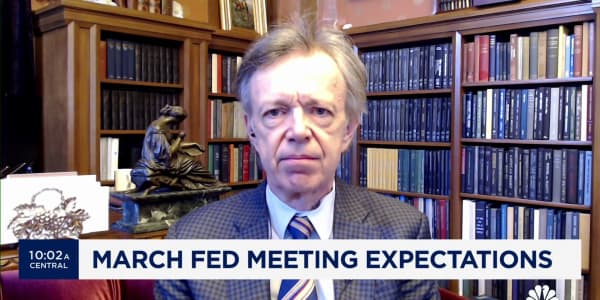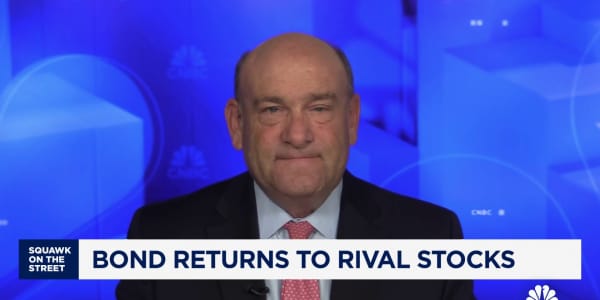
Wall Street isn't all that confident the Federal Reserve can end its easy money policies without a market crash, a recession or high inflation.
In its July Fed Survey, CNBC asked Wall Street pros how the Fed's current policies will end and found market participants surprisingly divided.
Thirty-four percent say the most likely outcome is that it "will end badly," which we defined as either a recession, stock market crash, high inflation or some combination of the three.
Another 34 percent, however, think the Fed will "navigate a smooth transition to more normal policy."
A quarter of the 36 respondents, who include economists, analysts and fund managers, think the risks are evenly balanced.
The numbers could be comforting to the Fed because they suggest a good portion of the market remains on guard, limiting risk-taking amid zero interest rates.
They also give credence, however, to the idea Fed policy is holding back the recovery. Worries about a calamitous end to current policies could be discouraging investments that would help the economy.
At the same, the current policy has a lot of support among market participants. Three-quarters say the Fed should reduce its asset purchases at the current pace, and 62 percent think the Fed communications are either "very" or "somewhat" clear and credible.
Amid signs of an improving economy, however, about half of the respondents say the Fed's monetary policy is too accommodative. Forty-three percent think it's "just right."
"The current pace of improvement in labor markets and subdued inflation suggest the Fed should be raising rates by late this year," said John Kattar of Ardent Asset Advisors.
Economist Bob Brusca said: "The Fed is lagging assuming inflation pressures will drop. It seems to be getting behind the inflation eight ball."
Hugh Johnson of Hugh Johnson Advisors disagrees. "If an (inflation) acceleration occurs, it is quite manageable" by having the Fed raise interest on excess reserves or execute reverse repos.
Respondents added a quarter point to their outlook for the Fed funds rate in 2015, which is now seen rising to 1 percent.
The first rate hike is seen coming in August 2015.
The market no longer has any doubt about the outlook for tapering this year. The balance sheet is expected to rise by $480 billion in 2014, which would be in line with the Fed reducing its asset purchases by $10 billion a month until the October meeting when it is expected to end quantitative easing with a $15 billion taper.
Participants have also changed their view of the balance sheet in 2015 after Fed suggestions it won't sell assets until rates rise, at the earliest.
While the April Fed Survey showed an average expected decline of $146 billion to the Fed's $4.3 trillion balance sheet, the July survey shows that no balance sheet decline is expected in 2015.
The economic growth outlook has taken a hit after the sharp decline recorded during the first quarter. Year-over-year GDP growth is now expected to be just 1.9 percent this year, down from April's forecast of 2.3 percent.
The 2015 growth outlook is stronger, but not as optimistic as it was, falling to 2.75 percent from 3 percent in April.
The chance of a U.S. recession in the next year remains muted with just a 16 percent probability.
Conflicts in Ukraine and the Middle East are seen having only a minimal impact on the U.S. economy and pose little risk for wider global financial instability.
Survey respondents continue to believe the biggest threat to the U.S. economy remains tax and regulatory policies.
Forecasts for the benchmark stock index put it comfortably above the 2,000 level in 2015, with an average expectation of 2,053 next summer and 2,075 in December of next year.
The average forecast, however, has it rising to only 2,000 by the end of this year, about half a percentage point away from current levels.
Bulls, though, may take heart from the survey respondents' overly pessimistic track record. They have collectively underestimated the market for most of the current upward run.
Forecasts for the U.S. 10-year yield in 2014 have dropped to their lowest level in the past year with the benchmark note seen ending the year at just 2.83 percent, and rising to just 3.15 percent over the next year. By the end of 2015, it's seen at just 3.4 percent.
—By CNBC Senior Economics Reporter Steve Liesman





